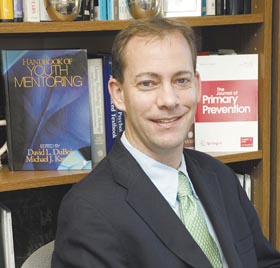  |
| HOME | THIS ISSUE | CALENDAR | GRANTS | BACK ISSUES | < BACK | NEXT > |
Family Studies professor studying mentors’ impact on at-risk kidsby Karen Singer - October 24, 2005 |
||||
|
The term ‘youth mentor’ may conjure up warm and fuzzy images of volunteers making a difference in a child’s life. But few have studied the impact of such efforts.
“The idea of mentoring as a prevention or intervention focus has become very hot over the past couple of years,” says Preston Britner, an associate professor of family studies. “There are many programs for children who are failing in school, abused, or in foster care. “Everybody likes it. Everybody’s gut tells them it makes sense,” Britner adds. “But what works and for whom is very much unanswered.” Earlier this year, Gov. M. Jodi Rell invited Britner to join the Connecticut Mentoring Partnership’s (CMP) Mentoring Leadership Council. Part of his job is to work with agencies to find out how they select and train mentors, and how to assess whether the programs are effective. Even before joining the Mentoring Leadership Council, Britner, with graduate student Tara Folan, began gathering information on 500 children participating in mentoring programs at city, suburban, and rural schools in 16 school districts around the state. “The kids were targeted as academically at-risk, and they had spent a period of time with mentors, once a week, for one to three years,” Britner says. “This is not the same as community-based mentoring, where the kid and mentor can get together more often, and the mentor can take the kid to the park or to work or other places. In-school mentoring is much more constrained.” And much less studied. Still, the results of his study appeared to show the favorable influence of mentors. “The kids reported they were improving academically and improving behaviorally,” Britner says. “Interestingly, they still reported being concerned about their own abilities. “But they seem to be happy, and the coordinators seem to be running good programs – following national guidelines and screening out people who aren’t there for the right reasons.” Despite the good outcomes, Britner questioned whether the data reflected the overall reality of school-based mentoring. “We had a selective sample,” he says. “Most programs don’t have coordinators who’ve been there five years.” Another flaw was that the students, mentors, and program coordinators assessed themselves. Britner shared the results of his initial study and his mentoring program evaluation plans with the Mentoring Leadership Council. “We identified evaluation as a priority,” he says, “allowing me to set up a new project.” He and graduate student Rachel Luck are working with the children from the first study. Now they are gathering empirical information from school administrative databases on grades, absenteeism, and other variables. “Certainly we’re going to learn more as we link the self-reported data to the administrative data,” he says. He also wants to find out what sort of training the mentors received. “Part of the beauty of mentoring, when it does work, is the connection between kids and adults,” he says. “Providing the child with someone who is available, who’s interested, and who cares, changes the way a child thinks about him or herself, the school community, and relationships with others.” Britner expects to send some recommendations and feedback to state entities this fall, and to complete analysis of the data by next spring. He plans to write technical papers and journal articles on the subject. He already has published a journal article and a handbook chapter on youth mentoring and a special issue of The Journal of Primary Prevention on the topic. “This whole venture has been a really nice example of the state Department of Education, the Governor’s Prevention Partnership, and UConn all working together,” he says. “At the same time the payoff for me is to learn and help out the state.” The results, he adds, are going to have a direct impact on mentor training and programming. Britner also is working on a pilot study about mentoring children of incarcerated parents. “They show really high rates of trauma and stress,” he says. He believes that mentoring may be used to link children with other social services. |
| ADVANCE HOME UCONN HOME |

